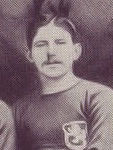
Colin Anderson Stein is a Scottish former footballer, who played for Hibernian, Rangers, Coventry City and Kilmarnock. Stein was part of the Rangers team that won the 1971–72 UEFA Cup Winners' Cup, and he scored one of the goals in a 3–2 victory against Dinamo Moscow in the final. Stein also represented Scotland and the Scottish League XI. He scored nine goals in 21 appearances for Scotland, including four goals in a 1970 FIFA World Cup qualification match against Cyprus.
Wanderers Football Club was an English association football club. It was founded as "Forest Football Club" in 1859 in Leytonstone. In 1864, it changed its name to "Wanderers", a reference to it never having a home stadium, instead playing at various locations in London and the surrounding area. Comprising mainly former pupils of the leading English public schools, Wanderers was one of the dominant teams in the early years of organised football and won the inaugural Football Association Challenge Cup in 1872. The club won the competition five times in total, including three in succession from 1876 to 1878, a feat which has been repeated only once.
Samuel English was a Northern Irish footballer who played for several clubs during the 1930s, but is mainly remembered for his time with Rangers. English also won two international caps for Ireland.
The following are events in the 1850s decade which are relevant to the development of association football. Included are events in closely related codes, such as the Sheffield Rules. All events happened in English football unless specified otherwise.
The following are events in the 1860s decade which are relevant to the development of association football. Included are events in closely related codes, such as the Sheffield Rules. All events happened in English football unless specified otherwise.
James Joseph Lang was a Scottish international footballer who represented Scotland twice from 1876 to 1878.
Clydesdale F.C. was a nineteenth-century Glasgow-based football club, which was attached to Clydesdale Cricket Club.
Alexander George Cheyne was a Scottish footballer who played as an inside forward. He is reputed to have been responsible for the Hampden Roar following his goal in the 'Cheyne International' of 1929.
John Smith was a Scottish footballer of the 1870s and 1880s. He is also notable for playing rugby union and was a member of the first British Lions team that toured Australia and New Zealand in 1888.
Joseph Lindsay was a Scottish footballer.
Edward Charles Bambridge was an English footballer who made eighteen appearances as a left winger for England between 1879 and 1887, being appointed captain twice. He was one of three brothers who played for England.
William Brindle was an English footballer who played his club football at left-back for Darwen and Blackburn Olympic. He made two appearances for England in 1880, scoring once.
Francis John Sparks was an English amateur footballer, who played as a forward. He won the FA Cup in 1880 with Clapham Rovers and made three appearances for England, scoring three goals and being appointed captain.
Claude William Wilson was an English amateur footballer who played in the 1880 FA Cup Final for Oxford University and made two appearances for England.
George Huth Cotterill was an English amateur footballer who made four appearances for England as a forward in the 1890s, captaining the side on his last two appearances. He usually played as an inside right or centre forward.

John McDougall was a Scottish footballer, who played for Scotland between 1877 and 1879. During his international career he played five matches, scoring four goals. He was the first player to score a hat-trick in an international game, scoring three goals for Scotland against England in a 7–2 win on 2 March 1878. During his domestic career he played for Vale of Leven.

